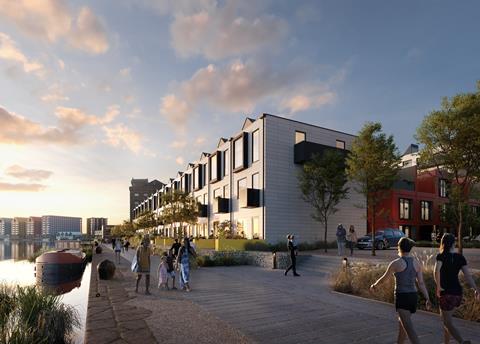Manchester regeneration developer reports pre tax profit growth but says it fears a ’lasting economic downturn’
Regeneration specialist developer Urban Splash has decided to rein in development amid fears over “lasting economic downturn”, despite seeing its pre-tax profit more than triple in its latest results.

Urban Splash Group Holdings Ltd reported turnover of £66.5m in the year to September 30 2021, up 68% on the previous year, producing a pre-tax profit of £6m, up from £1.66m in 2020.
The publication of the results comes after the Manchester-based business also secured a £43.5m refinancing deal with Aviva investors, replacing a number of separate loans which had been due to expire this autumn.
However, despite recording this progress, Urban Splash’s chief financial office Julian Curnuck said in a statement within the accounts that there was a “climate of uncertainty” in the industry due to “the lasting effects of covid 19, the war in Ukraine and the UK cost of living crisis”.
He said that “consequently” the business was adopting a “reduced risk appetite […] given these unprecedented levels of uncertainty and the prospect of a lasting economic downturn”. He said the group was therefore “limiting its exposure to onsite construction activity taking a cautious approach to new development activity.”
The statement comes after the firm, which is behind lauded regeneration schemes such as the refurbishment of Park Hill in Sheffield and New Islington in Manchester, saw its “demerged” modular housebuilding joint venture, House by Urban Splash, go into administration earlier this year.
In notes to the accounts, it said that at the time of Urban Splash House going into administration, the Urban Splash Group was providing it with construction services which were terminated, and was owed money. As a result, it said, group staff had to be made redundant, but the statement did not say how many staff were laid off as a result of the collapse, or how much it was owed. It said “the ultimate recovery will depend on the outcome of the administration process”.
The firm progressed construction works at its Meville project in Plymouth and Park Hill scheme in Sheffield during the year, however, the accounts also state that the year saw covid delays cause “building delays, supply shortages and consequently an extension to the forecast project end date and increase to the total forecast project costs.”
The accounts show that Urban Splash’s debt now consist of a £17m interest free loan on demand loan from the group’s main shareholders, a £16.2m bank facility expiring in January 2025 and a £40.3m facility expiring in July 2030 – plus £6.8m in cash.
In a statement release last week ahead of the publication of the accounts, the firm described the business’s results as a ““solid performance in a difficult year”. The group, which also has a portfolio of commercial properties, said it had an active development pipeline with sites in Plymouth, Milton Keynes, Swansea, Birmingham, Windermere, Sheffield and Manchester.
Urban Splash has been contacted to comment further on the extent of its planned development slowdown.











No comments yet